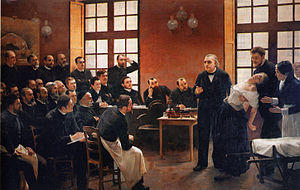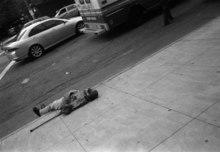| Unconsciousness | |
|---|---|
 | |
| Jean-Martin Charcot demonstrating hypnosis on a "hysterical" Salpêtrière patient, "Blanche" (Marie Wittman), who is supported by Joseph Babiński.[1] | |
| Specialty | Psychiatry Neurology |
Unconsciousness is a state which occurs when the ability to maintain an awareness of self and environment is lost. It involves a complete, or near-complete, lack of responsiveness to people and other environmental stimuli.[2] Unconsciousness may occur as the result of traumatic brain injury, brain hypoxia (inadequate oxygen, possibly due to a brain infarction or cardiac arrest), severe intoxication with drugs that depress the activity of the central nervous system (e.g., alcohol and other hypnotic or sedative drugs), severe fatigue, anaesthesia, and other causes.
Loss of consciousness should not be confused with the notion of the psychoanalytic unconscious, cognitive processes that take place outside awareness (e.g., implicit cognition), and with altered states of consciousness such as sleep, delirium, hypnosis, and other altered states in which the person responds to stimuli, including trance and psychedelic experiences.
Law and medicine

In jurisprudence, unconsciousness may entitle the criminal defendant to the defense of automatism, i.e. a state uncontrollably of one's own actions, an excusing condition that allows a defendant to argue that they should not be held criminally liable for their actions or omissions. In most countries, courts must consider whether unconsciousness in a situation can be accepted as a defense; it can vary from case to case. Hence epileptic seizures, neurological dysfunctions and sleepwalking may be considered acceptable excusing conditions because the loss of control is not foreseeable, but falling asleep (especially while driving or during any other safety-critical activity) may not, because natural sleep rarely overcomes an ordinary person without warning.
In many countries, it is presumed that someone who is less than fully conscious cannot give consent to anything. This can be relevant in cases of sexual assault, euthanasia, or patients giving informed consent with regard to starting or stopping a medical treatment.
See also
References
- ^ See: A Clinical Lesson at the Salpêtrière.
- ^ "MeSH Browser". www.nlm.nih.gov. Retrieved 18 March 2018.
External links
| Classification |
|---|